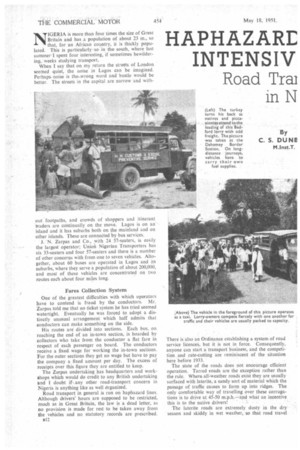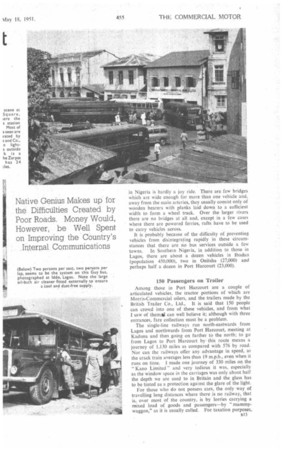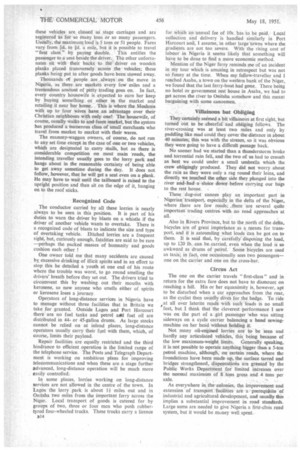HAPHAZARE INTENSIV
Page 46

Page 47

Page 48

If you've noticed an error in this article please click here to report it so we can fix it.
Road Trai
By C. S. DUNE M.Inst.T. NIGERIA is more than four times the size of Great Britain and has a population of about 23 m., so that, for an African country, it is thickly populated. This is particularly so in the south, where last summer I spent four interesting, if sometimes bewildering, weeks studying transport.
When I say that on my return the streets of London seemed quiet, the noise in Lagos can be imagined. Perhaps noise is the-wrong word and bustle would be better. The streets in the capital are narrow and with out footpaths, and crowds of shoppers and itinerant traders are continually on the move. Lagos is on an island and it has suburbs both on the mainland and on other islands. These are connected by bus services.
J. N. Zarpas and Co., with 24 57-seaters, is easily the largest operator; Union Nigerian Transporters has six 33-seaters and four 57-seaters and there is a number of other concerns with from one to seven vehicles. Altogether, about 60 buses are operated in Lagos and its suburbs, where they serve a population of about 200,000, and most of these vehicles are concentrated on two routes each about four miles long.
Fares Collection System
One of the greatest difficulties with which operators have to contend is fraud by the conductors, Mr. Zarpas told me that no ticket system he has tried seemed watertight. Eventually he was forced to adopt a distinctly unusual arrangement which half admits that conductors can make something on the side.
His routes are divided into sections. Each bus, on reaching the end of an in-town section, is boarded by collectors who take from the conductor a fiat fare in respect of each passenger on board. The conductors receive a fixed wage for working the in-town sections.
• For the outer sections they get no wage but have to pay the company a fixed amount per day. The excess of receipts over this figure they are entitled to keep.
The Zarpas undertaking has headquarters and workshops which would do credit to any British undertaking snd I doubt if any other road-transport concern in Nigeria is anything like as well organized.
Road transport in general is run on haphazard lines. Although drivers' hours are supposed to be restricted, much as in Great Britain, the law is a dead letter, as no provision is made for rest to be taken away from the vehicles and no statutory records are prescribed.
There is also an Ordinance establishing a system of road service licences, but it is not in force. Consequently, anyone can start a transport business, and the competition and rate-cutting are reminiscent of the situation here before 1933.
The state of the roads does not encourage efficient operation. Tarred roads are the exception rather than the rule. Where all-weather roads exist they are usually surfaced with laterite, a sandy sort of material which the passage of traffic causes to form up into ridges. The only comfortable way of travelling over these corrugations is to drive at 45-50 m.p.h.—and what an incentive
this is to the native drivers!
The laterite roads are extremely dusty in the dry season and skiddy in wet weather, so that road travel in Nigeria is hardly a joy ride. There are few bridges which are wide enough for more than one vehicle and. away from the main arteries, they usually consist only of wooden bearers with planks laid down to a sufficient width to form a wheel track. Over the larger rivers there are no bridges at all and, except in a few cases where there are powered ferries, rafts have to be used to carry vehicles across.
It is probably because of the difficulty of preventing vehicles from disintegrating rapidly in these circumstances that there are no bus services outside a few towns. In Southern Nigeria, in addition to those in Lagos, there are about a dozen vehicles in Ibadan (population 450,000), two in Onitsha (27,000) and perhaps half a dozen in Port Harcourt (23,000).
150 Passengers on Trailer
Among those in Port Harcourt are a couple of articulated vehicles, the tractor portions of which are Morris-Commercial oilers, and the trailers made by the British Trailer Co., Ltd., It is said that 150 people can crowd into one of these vehicles, and from what I saw of them* can well believe it; although with three entrances, fare collection must be a problem.
The single-line railways run north-eastwards from Lagos and northwards from Port Harcourt, meeting at Kaduna and then going on farther to the north; to go from Lagos to Port Harcourt by this route means a journey of 1,130 miles as compared with 576 by road. Nor can the railways offer any advantage in speed, as the crack train averages less than 19 m.p.h., even when it runs on time. I made one journey of 330 miles on the "Kano Limited" and very tedious it was, especially as the window space in the carriages was only about half the depth we are used to in Britain and the glass has to be tinted as a protection against the glare of the light.
For those who do not possess cars, the only way of travelling long distances where there is no railway, that is, over most of the country, is by lorries carrying a mixed load of goods and passengers—by "mammywaggon," as it is usually called. For taxation purposes, these vehicles are classed as stage carriages and are registered as for so many tons or so many passengers. Usually, the maximum load is 5 tons or 51 people. Fares vary from Id. to id. a mile, but it is possible to travel "first class" by paying double. This entitles the passenger to a seat beside the driver. The other unfortunates sit with their backs to the driver on wooden planks placed transversely across the vehicles; these planks being put in after goods have been stowed away.
Thousands of people are _always on the move in Nigeria, as there arc markets every few miles and a tremendous amount of petty trading goes on. In fact, every country housewife is expected to earn her keep by buying something or other in the market and retailing it near her home. This is where the Moslems with up to four wives have an advantage over their Christian neighbours with only one! The housewife, of course, usually walks to`and from market, but the system has produced a numerous class of small merchants who travel from market to market with their wares_
The mammy-waggon owners, of course, do not run to any set time except in the case of one or two vehicles, which are designated to carry Mails, but as there is considerable competition on most main 'roads, the intending traveller usually goes to the lorry park and hangs about in the reasonable certainty of being able to get away sometime during the day. It does not follow, however, that he will get a seat even on a plank. He may have to wait until the tailboard is raised to the upright position and then sit on the edge of it, hanging on to the roof sticks.
Recognized Code
The conductor carried by all these lorries is nearly always to be seen in this position. It is part of his duties to warn the driver by blasts on a whistle if the driver of another vehicle wants to overtake. There is a recognized code of blasts to indicate the size and type of overtaking vehicle. Ditched lorries are a frequent sight, but, curiously enough, fatalities are said to be rare —perhaps the packed masses of humanity and goods cushion each other !
One owner told me that many accidents are caused by excessive drinking of illicit spirits and in an effort to stop this he detailed a youth at one end of his route where the trouble was worst, to go round smelling the drivers' breath before they set out. The drivers tried to circumvent this by washing out their mouths with kerosene, so now anyone who smells either of spirits or kerosene loses a journey.
Operators of long-distance services in Nigeria have to manage without three facilities that in Britain we take for granted. Outside Lagos and Port Harcourt there are no fuel tanks and petrol mkt fuel oil are distributed in 44or 45-gallon drums. As large stocks cannot be relied on at inland places, long-distance operators usually carry their foe with them, which, of course, limits their payload.
Repair facilities are equally restricted and the third hindrance to efficient operation is the limited range of the telephone service. The Posts and Telegraph Department is working on ambitious plans for improving telecommunications and when these are a stage further advanced, long-distance operation will be much more easily controlled.
in some places, lorries working on long-distance services are not allowed in the centre of the town. In Lagos the lorry park is about Ii miles out and in Onitsha two miles from the important ferry across the Niger. Local transport of goods is catered for by groups of two, three or four men who push rubbertyred four-wheeled trucks. These trucks carry a licence
al4
for Which an annual fee of 10s. has to be paid. Local collection. and delivery is handled similarly in Port Harcourt and, I assume, in other large towns where the gradients are not too severe. With the rising cost of labour in Nigeria it seems likely that something will have to be done to find a more economic method.
Mention of the Niger ferry reminds me of an incident in my tour which is amusing in retrospect but was not so funny at the time. When my fellow-traveller and I reached Asaba, a town on the western bank of the Niger, we found that the last ferry-boat had gone. There being no hotel or government rest house in Asaba, we had to get across the river to Onitsha somehow and this meant bargaining with some canoemen_ Villainous but Obliging
They certainly seemed a bit villainous at first sight, but turned out to be cheerful and obliging fellows. The river-crossing was at least two miles and only by paddling like mad could they cover the distance in about 40 minutes; this was with the stream, so it was obvious they were going to have a difficult passage back.
No sooner had we started than a thunderstorm broke and torrential rain fell, and the two of us had to crouch as best we could under a small umbrella which the crew obligingly produced. They did not worry. •about the rain as they wore only a rag round their loins, and directly we touched the other side they plunged into the river and-had a sluice down-before carrying our bags to the rest house. •
These dug-out canoes play an important part in Nigerian tranSport, especially in the delta of the Niger, where there are few roads; ,there are several quite important trading centreswith no road approaches at all.
Alsoin Rivers Province, bid to the north of the delta, bicycles are of great impbriance as a means for transport, and it is astounding what loads can be got on to them. It is said that, by carefully disposing the load, up to 120 lb. can be carried, even when the load is so awkward as drums of petrol. Some bicycles are used as taxis; in fact, one occasionally sees two passengers— one on the carrier and one on the cross-bar.
Circus Act
The one on the carrier travels " first-class " and in return for the extra fare does not have to dismount on reaching a hill. His or her equanimity is, however, apt to be disturbed when a car approaches from the rear, as the cyclist then usnally dives for the hedge. To ride at all over laterite roads with such loads is no small feat, but I think that the cleverest performance I saw was on the part of a girl passenger who was sitting sideways on a cycle carrier balancing a hand sewingmachine on her head without holding it.
Not many oil-engined lorries are tobe seen and hardly any articulated vehicles, this being because of the low maximum-weight limits. Generally speaking, it is not possible to operate anything bigger than a 5-ton petrol machine, although, on certain roads, where the foundations have been made up, the surface tarred and bridges strengthened, dispensations are granted by the Public Works Department for limited increases over the normal maximum of 8 tons gross and 4 tons per axle. • As everywhere in the colonies, the improvement and extension of transport facilities are a prerequisite of industrial and agricultural development, and usually this implies a substantial improvement in road standards. Large sums are needed to give Nigeria a first-class road system, but it would be money well spent.




























































































